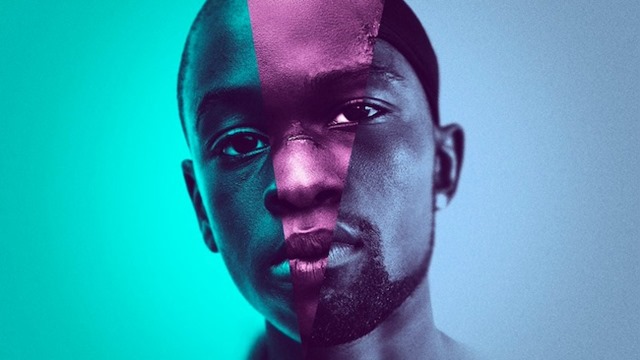Written by Katherine Murray.
Moonlight is a serious, introspective, understated film from director Barry Jenkins that’s been an overwhelming hit with critics, winning numerous awards for acting, directing, writing, and Best Picture, including at the Academy Awards, Golden Globes, Independent Spirit Awards, and Screen Actors Guild Awards. It’s about a gay, Black drug dealer who lives in Miami — and it doesn’t think that any of those things are either funny or shameful.
The main selling point for Moonlight is that it’s different from other movies. Unfortunately, that also makes it hard to explain – the difference of Moonlight is something you feel while you’re watching it. It’s like Plato’s overused allegory of the cave – everything we knew about this world before was shadow and puppetry; now we’ve seen a glimpse of the real thing.
Moonlight deals with highly politicized content – race, class, sexuality, gender expression, drug use – in a disarmingly nuanced way. It parachutes into territories dominated by stories about hate and dares instead to tell us stories about love. The film checks in with its protagonist, Chiron (played by Alex R. Hibbert, Ashton Sanders, and Trevante Rhodes), at three different points in his life – as a child, growing up in a rough neighborhood; as a teen, struggling with his sexuality; and as an adult, seeking a sense of authenticity. Each chapter ends at a startling point and begins by defying any stereotypes we’ve come to expect.

Hilton Als’ gorgeous essay in The New Yorker unpacks the story in more detail, and offers more insight into what it means to see Black gay men depicted this way on film, but, like Als, I was struck by my own reaction to the film’s first chapter. In that story, the young Chiron makes friends with a neighborhood drug dealer (Mahershala Ali) who becomes a surrogate father to him. I spent the first two thirds of that chapter with my shoulders and stomach clenched, waiting for something awful to happen. I was waiting for the drug dealer to be a bad person. I was waiting for Chiron to be disappointed, or rejected, or hurt somehow by this relationship. I was surprised and moved when I realized I was actually seeing kindness. I was seeing a picture of men with do-rags and pistols who love.
A lot of stories about poor Black communities are stories about either pity or invulnerable hyper-masculinity. Love is a lot more humanizing than pity and a lot more vulnerable than a rap video. Love makes us real to each other – it lets us see each other as kin. There is a shocking tenderness to Moonlight that cuts across boundaries – there is a confident assertion that these are people whose stories matter; that their experiences are worth sharing; that we will feel connected to them and sit with them in their pain, and triumph, and struggle, and caring. It’s an assertion that Black lives are human lives, as rich, complex, meaningful, and worthy as any other lives we see on film. The characters aren’t offered to us as archetypes or clowns – they’re offered to us as our own.
Moonlight isn’t the first film to act like Black people are human, or like poor people are human, or like gay people are human – but it is a beautifully-made movie, with a rich emotional palette and an introspective style. One of its strengths is that, for a movie about love – that is, in many ways, essentially a romance, at its core – it doesn’t fall into the trap of being sentimental. While racism, homophobia, and poverty aren’t the topic of the film, they inform the setting and the characters’ worldview. There’s a powerful scene where Chiron’s mother (Naomie Harris), addicted to crack cocaine, screams at him, yelling words we can’t hear – words he later dreams or remembers as “Don’t look at me.” That sense of shame and self-hatred, manifested in the psychological violence she does to herself and her son, haunts every chapter of this story, but it’s allowed to exist alongside caring and hope, without either cancelling the other out.
The final two chapters of the film, in one way or another, concern Chiron’s relationship with his bisexual friend and primary love interest, Kevin (played by Jaden Piner, Jharrel Jerome, and André Holland), and the way that various pressures in his life converge to mold the way he presents himself to others. In some ways, Chiron comes full circle by growing up to be like the drug dealer who raised him – outwardly tough, physically strong, and kind.
Moonlight is about Black masculinity, and does an exquisite job of dramatizing gender performance, but it’s reductive to say it’s only about gender, sexuality, or identity. Moonlight is a movie that captures the zeitgeist of the early twenty-first century – of a generation that grew up in the 1980s and 90s; of a culture with a lot of bullshit things in it, that still has the courage to risk a vulnerability like love. It’s the kind of film that you want future generations to see, so they can understand what the world was like in the past – the kind of film you want future generations to be confused by, because so much has changed, and the kind of film you want them to connect to, because our humanity cuts across time.
Like many other festival films, Moonlight is a slow burn that requires some patience to watch. I promise you, though, that your patience will be rewarded. This movie stayed with me for weeks after I saw it, persistently tugging at my attention, making me want to watch it again. It’s different in a way you truly have to see to understand.
Katherine Murray is a Toronto-based writer who yells about movies, TV, and video games on her blog.



